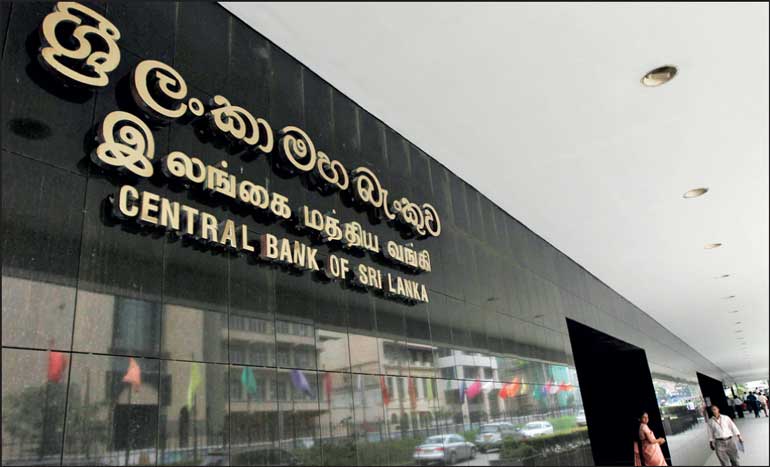Tuesday Feb 17, 2026
Tuesday Feb 17, 2026
Wednesday, 15 March 2023 00:10 - - {{hitsCtrl.values.hits}}

The Central Bank Executive Officers' Union (CBEOU) yesterday lobbied to all political parties seeking ‘true independence’ for the monetary regulatory authority ahead of the new bill to be taken up in Parliament.
The move follows the CBEOU identifying possible Impediments to Central Bank independence as outlined in the “Central Bank of Sri Lanka” Bill. CBEOU, is an employee trade union of Staff Officers of the CBSL. Separately four parties on Monday filed petitions in the Supreme Court challenging the new Central Bank bill too.
CBEOU yesterday wrote to the Speaker of Parliament with copies to the Opposition Leader and all party leaders expressing concern over seven sections of the Bill and listed recommendations.
The CBEOU said while appreciating the policy initiations taken on strengthening the independence of the Central Bank as the apex financial institution entrusted for implementing the Monetary Policy of the country, is concerned that the 'Central Bank of Sri Lanka' Bill may deviate from its ultimate purpose.
In view of this it was bringing to Speaker’s notice and consideration seven clauses that may impede the level of independence permitted to the Central Bank by the Bill with the view of strengthening independence, transparency, and accountability of CBSL while ensuring its de-politicisation, which is paramount for its effective functioning based on past experiences.
Following are the concerns and recommendations contained in the letter to Speaker written by CBEOU President and Assistant Secretary.
1. According to Section 8 of the Bill, the Governing Board which oversees the administration and management of the affairs of the Central Bank does not specify any of the Deputy Governors as members. It is therefore recommended that all Deputy Governors be included in the Governing Board as this will hold such officials accountable for the policy making, management and administration of the institution.
Further, it is recommended that the external members appointed to the Governing Board based on expertise to be limited to four (04) and such members to be nominated by the Constitutional Council and submitted to the President for the purpose of concurrence only.
2. Section 15. (7) of the Bill gives the power to the Minister of Finance to determine the number of Deputy Governors and to appoint them with the concurrence of the Governing Board. This practice could be interpreted as direct interference with the management of the Central Bank.
Therefore, it is recommended to vest the powers of appointing the Deputy Governors with the Governing Board and limiting the engagement of the finance minister to obtain concurrence. It is further recommended to set the statutory minimum number of Deputy Governors to be two (02).
3. Section 15. (9) provides for appointment of a Deputy Governor from among persons other than the employees of the Central Bank by the Minister of Finance. Such practice may allow for political interference in the position since the nomination is done by the Minister.
Hence, it is recommended that all the Deputy Governors be appointed exclusively from the current employment of the Central Bank by the Governing Board subject to ratification of the finance minister.
4. Section 16. (1) provides that the term of an appointed member is six (06) years. As the term “Appointed Member” is restricted to Section 15. (1) (b) this does not apply to the Governor, which would mean that the Governor holds office perpetually, until death, removal or resignation. Hence, it is recommended to impose a predetermined term for the post of the Governor.
5. Section 17. (3) enables the Governing Board with the concurrence of the Minister to temporarily release a Deputy Governor to serve in another entity as specified. Such a practice could be manipulated by the higher authority against any Deputy Governor unless it is done 'bona-fide'. Hence, it is recommended that such an action be done with the prior consent of the respective Deputy Governor similar to the procedure prescribed for other employees under Section 24. (2) of the Bill.
6. Section 23. (1) gives the power to the Governing Board to remove employees of the Central Bank 'notwithstanding anything to the contrary in any other written law'. This clause raises a serious concern whether the Governing Board is permitted to act in violation of the existing labour laws of the country. Therefore, we urge the policymakers to amend the said clause for the Governing Board to be bound by the applicable labour laws and other legislations.
7. Based on the objectives of the Central Bank as laid out in Section 6 of the Bill, the Central Bank shall support the general economic policy framework of the Government. However, based on past experience policy congruence could be hampered by the ad hoc changes to the general economic policy of the country. Hence, it is recommended that the Central Bank report directly to Parliament when a need arises in terms of policy inconsistencies. This will further enhance accountability of the institution.
We humbly request Hon. Speaker and all the members of Parliament to seriously consider the above concerns of CBEOU and take action to incorporate necessary amendments to the Bill during the legislative process related to its enactment.
